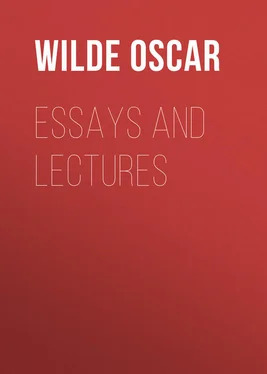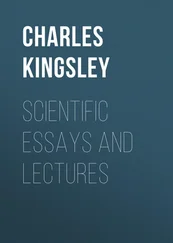Oscar Wilde - Essays and Lectures
Здесь есть возможность читать онлайн «Oscar Wilde - Essays and Lectures» — ознакомительный отрывок электронной книги совершенно бесплатно, а после прочтения отрывка купить полную версию. В некоторых случаях можно слушать аудио, скачать через торрент в формате fb2 и присутствует краткое содержание. Жанр: foreign_home, literature_19, foreign_prose, на английском языке. Описание произведения, (предисловие) а так же отзывы посетителей доступны на портале библиотеки ЛибКат.
- Название:Essays and Lectures
- Автор:
- Жанр:
- Год:неизвестен
- ISBN:нет данных
- Рейтинг книги:3 / 5. Голосов: 1
-
Избранное:Добавить в избранное
- Отзывы:
-
Ваша оценка:
- 60
- 1
- 2
- 3
- 4
- 5
Essays and Lectures: краткое содержание, описание и аннотация
Предлагаем к чтению аннотацию, описание, краткое содержание или предисловие (зависит от того, что написал сам автор книги «Essays and Lectures»). Если вы не нашли необходимую информацию о книге — напишите в комментариях, мы постараемся отыскать её.
Essays and Lectures — читать онлайн ознакомительный отрывок
Ниже представлен текст книги, разбитый по страницам. Система сохранения места последней прочитанной страницы, позволяет с удобством читать онлайн бесплатно книгу «Essays and Lectures», без необходимости каждый раз заново искать на чём Вы остановились. Поставьте закладку, и сможете в любой момент перейти на страницу, на которой закончили чтение.
Интервал:
Закладка:
And as regards the critical point urged by Palaiphatos, Strabo, and Polybius, that pure invention on Homer’s part is inconceivable, we may without scruple allow it, for myths, like constitutions, grow gradually, and are not formed in a day. But between a poet’s deliberate creation and historical accuracy there is a wide field of the mythopœic faculty.
This Euhemeristic theory was welcomed as an essentially philosophical and critical method by the unscientific Romans, to whom it was introduced by the poet Ennius, that pioneer of cosmopolitan Hellenicism, and it continued to characterise the tone of ancient thought on the question of the treatment of mythology till the rise of Christianity, when it was turned by such writers as Augustine and Minucius Felix into a formidable weapon of attack on Paganism. It was then abandoned by all those who still bent the knee to Athena or to Zeus, and a general return, aided by the philosophic mystics of Alexandria, to the allegorising principle of interpretation took place, as the only means of saving the deities of Olympus from the Titan assaults of the new Galilean God. In what vain defence, the statue of Mary set in the heart of the Pantheon can best tell us.
Religions, however, may be absorbed, but they never are disproved, and the stories of the Greek mythology, spiritualised by the purifying influence of Christianity, reappear in many of the southern parts of Europe in our own day. The old fable that the Greek gods took service with the new religion under assumed names has more truth in it than the many care to discover.
Having now traced the progress of historical criticism in the special treatment of myth and legend, I shall proceed to investigate the form in which the same spirit manifested itself as regards what one may term secular history and secular historians. The field traversed will be found to be in some respects the same, but the mental attitude, the spirit, the motive of investigation are all changed.
There were heroes before the son of Atreus and historians before Herodotus, yet the latter is rightly hailed as the father of history, for in him we discover not merely the empirical connection of cause and effect, but that constant reference to Laws, which is the characteristic of the historian proper.
For all history must be essentially universal; not in the sense of comprising all the synchronous events of the past time, but through the universality of the principles employed. And the great conceptions which unify the work of Herodotus are such as even modern thought has not yet rejected. The immediate government of the world by God, the nemesis and punishment which sin and pride invariably bring with them, the revealing of God’s purpose to His people by signs and omens, by miracles and by prophecy; these are to Herodotus the laws which govern the phenomena of history. He is essentially the type of supernatural historian; his eyes are ever strained to discern the Spirit of God moving over the face of the waters of life; he is more concerned with final than with efficient causes.
Yet we can discern in him the rise of that historic sense which is the rational antecedent of the science of historical criticism, the φυσικὸν κριτήριον , to use the words of a Greek writer, as opposed to that which comes either τέχνη or διδαχῇ .
He has passed through the valley of faith and has caught a glimpse of the sunlit heights of Reason; but like all those who, while accepting the supernatural, yet attempt to apply the canons of rationalism, he is essentially inconsistent. For the better apprehension of the character of this historic sense in Herodotus it will be necessary to examine at some length the various forms of criticism in which it manifests itself.
Such fabulous stories as that of the Phoenix, of the goat-footed men, of the headless beings with eyes in their breasts, of the men who slept six months in the year ( τοῦτο οὐκ ἐνδέχομαι ηὴν ἀρχήν ), of the wer-wolf of the Neuri, and the like, are entirely rejected by him as being opposed to the ordinary experience of life, and to those natural laws whose universal influence the early Greek physical philosophers had already made known to the world of thought. Other legends, such as the suckling of Cyrus by a bitch, or the feather-rain of northern Europe, are rationalised and explained into a woman’s name and a fall of snow. The supernatural origin of the Scythian nation, from the union of Hercules and the monstrous Echidna, is set aside by him for the more probable account that they were a nomad tribe driven by the Massagetæ from Asia; and he appeals to the local names of their country as proof of the fact that the Kimmerians were the original possessors.
But in the case of Herodotus it will be more instructive to pass on from points like these to those questions of general probability, the true apprehension of which depends rather on a certain quality of mind than on any possibility of formulated rules, questions which form no unimportant part of scientific history; for it must be remembered always that the canons of historical criticism are essentially different from those of judicial evidence, for they cannot, like the latter, be made plain to every ordinary mind, but appeal to a certain historical faculty founded on the experience of life. Besides, the rules for the reception of evidence in courts of law are purely stationary, while the science of historical probability is essentially progressive, and changes with the advancing spirit of each age.
Now, of all the speculative canons of historical criticism, none is more important than that which rests on psychological probability.
Arguing from his knowledge of human nature, Herodotus rejects the presence of Helen within the walls of Troy. Had she been there, he says, Priam and his kinsmen would never have been so mad ( φρενοβλαβεῖς ) as not to give her up, when they and their children and their city were in such peril (ii. 118); and as regards the authority of Homer, some incidental passages in his poem show that he knew of Helen’s sojourn in Egypt during the siege, but selected the other story as being a more suitable motive for an epic. Similarly he does not believe that the Alcmæonidæ family, a family who had always been the haters of tyranny ( μισοτύραννοι ), and to whom, even more than to Harmodios and Aristogeiton, Athens owed its liberty, would ever have been so treacherous as to hold up a shield after the battle of Marathon as a signal for the Persian host to fall on the city. A shield, he acknowledges, was held up, but it could not possibly have been done by such friends of liberty as the house of Alcmæon; nor will he believe that a great king like Rhampsinitus would have sent his daughter κατίσαι ἐπ’ οἰκήματος .
Elsewhere he argues from more general considerations of probability; a Greek courtesan like Rhodopis would hardly have been rich enough to build a pyramid, and, besides, on chronological grounds the story is impossible (ii. 134).
In another passage (ii. 63), after giving an account of the forcible entry of the priests of Ares into the chapel of the god’s mother, which seems to have been a sort of religious faction fight where sticks were freely used ( μάχη ξύλοισι καρτερή ), ‘I feel sure,’ he says, ‘that many of them died from getting their heads broken, notwithstanding the assertions of the Egyptian priests to the contrary.’ There is also something charmingly naïve in the account he gives of the celebrated Greek swimmer who dived a distance of eighty stadia to give his countrymen warning of the Persian advance. ‘If, however,’ he says, ‘I may offer an opinion on the subject, I would say that he came in a boat.’
Читать дальшеИнтервал:
Закладка:
Похожие книги на «Essays and Lectures»
Представляем Вашему вниманию похожие книги на «Essays and Lectures» списком для выбора. Мы отобрали схожую по названию и смыслу литературу в надежде предоставить читателям больше вариантов отыскать новые, интересные, ещё непрочитанные произведения.
Обсуждение, отзывы о книге «Essays and Lectures» и просто собственные мнения читателей. Оставьте ваши комментарии, напишите, что Вы думаете о произведении, его смысле или главных героях. Укажите что конкретно понравилось, а что нет, и почему Вы так считаете.












